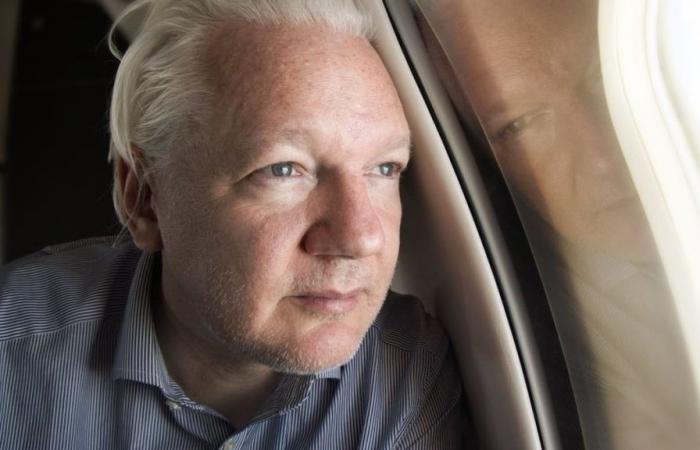The release of Julian Assange, who will return to his native Australia this Wednesday night (local time) after 12 years of confinement in London and after pleading guilty to espionage in a US court in the Northern Mariana Islands, buries a long citizen campaign who advocated for years for his redemption and fuels a political debate that has led the Labor Government to receive the news with caution.
Assange was born in 1971 in Townsville, a town on Australia’s northeast coast, but grew up in a dozen cities following his mother’s traveling theater company as it became a hacker teenager who was already putting the local authorities on the ropes. Since 2010 he made the world talk about freedom of information after the revelation of millions of classified documents that revealed war crimes and put him in the crosshairs of the United States, a record that means he will not be received as a prodigal son. His return to Australia, rather, concludes months of quiet Government diplomacy and growing support in the streets and Congress for an Australian citizen not to be subject to the courts of another country.
“Whatever opinions people have about Mr. Assange’s activities, the case has dragged on for too long,” Prime Minister Anthony Albanese said in an appearance before Parliament on Tuesday: “There is nothing to gain from his prolonged imprisonment and “We want to bring it home.”
Albanese, leader of a Labor government that came to power in mid-2022, turned around almost a decade of official passivity on the Assange case by the conservative governments that preceded him. He had in his favour the fact that he came to power months after Australia signed a strategic defence agreement in the Pacific that intensified its relationship with the United States and England, and an agenda of meetings with the American authorities.
In July of last year, the first signs began to be seen: from Brisbane, accompanied by the Minister of Foreign Affairs of Australia, Penny Wong, the Secretary of State, Antony Blinken, stated that the case of the founder of Wikileaks had been part of the discussion at that time. Blinken said Assange was accused of “very serious criminal conduct” for his alleged role in one of the largest leaks of classified information in the country’s history, but that he “understood the concerns and vision of Australians.” .
The official line of the Albanese Government, which its Foreign Minister endorsed at the time, was always that the case “had gone on for a long time” and that “they expected a conclusion.” For Australians, who saw a center-left government approaching the United States in its battle against China’s expansion in the Pacific Ocean, the case became a yardstick to measure the weight that Albanese’s word would have in front of the president. American, Joe Biden.
In February of this year, the Australian Parliament passed a motion with 86 votes out of a possible 151 in the House of Representatives to call on the United States and Britain to “close the matter” and allow Assange “to return to his home and family.” in Australia”. 42 representatives of the conservative coalition voted against, but the motion approved by Labor and the progressive Green Party got some conservative parliamentarians to vote in favor and made official the support that for years was brewing in the Australian Congress without the approval of the conservative governments and after years of street protests in the country’s main cities.
Biden’s response came in April, when a reporter asked him how he responded to the Australian request and the American president, passing by and without looking at him, sparked some optimism with three words: “We are considering it.” Albanese, in a television interview days later, said the comment was indeed encouraging. “I am optimistic about a resolution, but we don’t have one yet,” he told Sky News. “We will continue to make the case at every opportunity we get.”
The eloquence of the Labor prime minister marked a contrast with that of his predecessor, the conservative Scott Morrison, who had barely referred to the issue, not counting two interventions: at the beginning of 2022, on the eve of the elections that led his party to defeat, and as the United States pushed for Assange’s extradition from England, he claimed that “the judicial system was making its way” and that Australia “was not an involved party.” Another intervention is remembered about Morrison, from 2019, when the actress and model Pamela Anderson, a friend of Assange and an activist for his release, asked him during an interview to work to take him back to Australia and Morrison replied that he would not do it, but that “many of his friends” had asked him to be “special envoys to settle this issue with Pamela Anderson.”
Assange was released at noon this Wednesday in Australia, after pleading guilty to espionage before a US court in Saipan, capital of the Northern Mariana Islands, which are an unincorporated territory of the United States in the Pacific Ocean, and after a judge considered his sentence served for the five years he spent in a maximum security prison in London. “You will be able to leave this room a free man,” Judge Ramona Manglona told him after ratifying in a hearing the agreement between Assange’s defense and the United States Department of Justice.
In Canberra, the administrative capital of Australia, the Government awaits him with a reception that still generates expectations due to the sober tone with which the news of his release from London was received. Also waiting for him is his wife and lawyer Stella, and the two young children they had while the Wikileaks editor was in captivity. “I hope his life is a little calmer and he spends a year or so learning to walk on the beach again, to feel the sand on his feet, to play with his children patiently…” his father said this morning, John Shipton, on 9 News, as the plane carrying his son landed in the Mariana Islands: “I wish him an ordinary life.”
Follow all the international information on Facebook and xor in our weekly newsletter.






